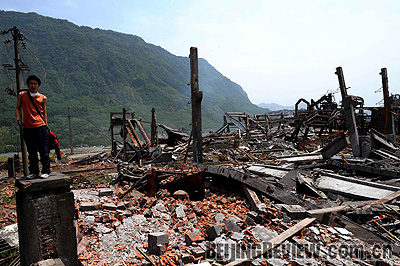|

THE LOST FACTORY: Hongda Chemical Industry Co. Ltd., a listed Sichuan-based company, had one of its factories collapse during the Wenchuan earthquake (ZHOU WENJIE)
Dongfang Electric Co., the largest power equipment manufacturer based in Sichuan Province, faces an unprecedented predicament because of the Wenchuan earthquake that shook the inland province on May 12. Dongfang Electric, situated in the hardest-hit area of the massive earthquake, found its factories collapsed, machineries destroyed and employees seriously injured.
Shenyin Wanguo Securities Co. Ltd. estimates that the Wenchuan earthquake would cause losses of 600 million yuan ($86 million) worth of Dongfang Electric's fixed assets. But the biggest blow for the company came from the stock market. On May 13, Dongfang Electric shares stopped trading because of the earthquake and did not resume trading until six days later. But on May 19, its stock price was held at the lower price (minus 10 percent), leading to a market value loss of more than 7 billion yuan ($1 billion).
Dongfang Electric is one of the scores of corporate casualties of the earthquake. Many financial analysts believe that the direct economic losses caused by the quake would amount to far more than the damages caused by the blizzard that hit the central part of the country early this year. They argue that the earthquake may pull down the country's second quarter economic growth and have certain impacts on macro-economic control polices.
Huge direct economic losses
The earthquake shook Sichuan, Gansu and Shaanxi provinces and Chongqing Municipality, affecting more than 100,000 square km and more than 10 million people. By May 19, more than 3.13 million houses had collapsed and 15.61 million more were damaged. Roads, electric power and telecommunication facilities, and water and gas supplies were severely damaged, bringing in huge losses.
In an interview with China Securities Journal (CSJ), Fan Jianping, chief economist at the State Information Center, estimated that the earthquake caused more losses compared with the blizzard earlier this year. The blizzard caused 151.6 billion yuan ($22 billion) in direct economic losses, while the earthquake has been estimated to cause a loss of 600 billion yuan ($86 billion), he said.
But one foreign financial institution believes the economic losses caused by the earthquake are much less. AIR Worldwide Corp., a leading risk modeling and technology firm, estimated the earthquake could cause only $20 billion in overall economic losses.
The damages to earthquake-affected companies could constitute the major part of the overall economic losses. Statistics issued on May 18 by the provisional general supervisory body headed by Chinese Premier Wen Jiabao indicate that at least 14,000 factories in Sichuan have been affected, with losses reaching 67 billion yuan ($9.57 billion). But more time will be needed to calculate further losses while the recovery and clean-up efforts continue.
Fueling inflation
CITIC Securities Co. Ltd. believes the greatest impact of the earthquake might be a surge in consumer prices. The increase in food prices, especially pork, is the main cause of current inflation. Sichuan is a major agricultural province, with its arable land and grain output accounting for 8.2 percent and 9.2 percent of the national total, respectively. Because the earthquake destroyed agricultural production facilities, materials and equipment in Sichuan, its grain output will shrink substantially, according to a CITIC Securities report.
Sichuan also is China's largest pork production base. Transportation disruptions caused by the quake have slowed pork distribution and will lead to continuous pork price surges of up to 6 percent in the following months, said CITIC Securities.
CITIC Securities also believes the earthquake could push the consumer price index (CPI), a barometer of inflation, up 0.3 percentage point for the whole year. It also said the earthquake has made it less possible for the Chinese Government to maintain the CPI growth rate at its target level of 4.8 percent.
Economy remains stable
Chu Jianfang, chief macro-economic analyst at CITIC Securities, said in a company report issued immediately after the earthquake that although the disaster could have a negative impact on the country's second quarter economic performance, it would only have a short-term influence. In the next two quarters, the economy could resume normal operation and be revived, Chu added.
CITIC Securities said that the areas hit hardest by the earthquake were in remote mountainous areas with few factories and agricultural production and that the production facilities in major production areas still remain intact.
Other experts agree. Fan Jianping said the reconstruction efforts in the aftermath of the earthquake could attract more investment, which would probably push up the country's GDP.
Ou Minggang, a finance professor at China Foreign Affairs College, told CSJ that he believes the earthquake's impact on the overall performance of the Chinese economy will be limited, because Sichuan's GDP does not comprise a large part of national GDP. | 